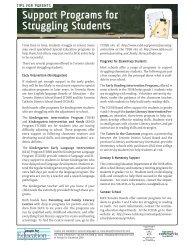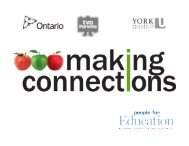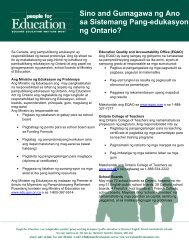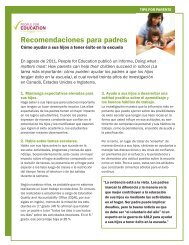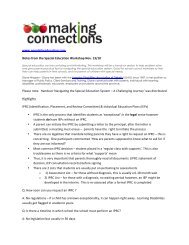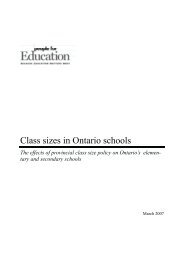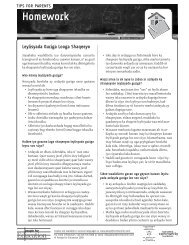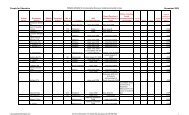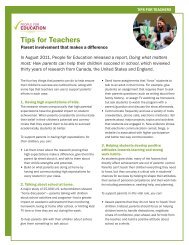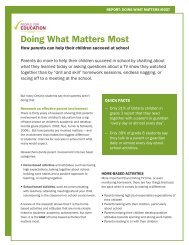Our Children Our Future Our Vision - People for Education
Our Children Our Future Our Vision - People for Education
Our Children Our Future Our Vision - People for Education
You also want an ePaper? Increase the reach of your titles
YUMPU automatically turns print PDFs into web optimized ePapers that Google loves.
<strong>Our</strong> <strong>Children</strong>, <strong>Our</strong> <strong>Future</strong>, <strong>Our</strong> <strong>Vision</strong><br />
ticipate in that system or to replicate it in their own schools is a <strong>for</strong>m of cultural racism. 226 Canadian<br />
educators are not able to implement an Indigenous vision of education due to systemic discrimination<br />
of federal and provincial governments who continue to use education as <strong>for</strong>ced assimilation.<br />
227 The apology <strong>for</strong> residential schools and “killing the Indian in the child” by Prime Minister<br />
Harper in 2008 is an empty promise if Canada continues assimilation in provincial schools. 228<br />
For any plan going <strong>for</strong>ward, First Nation education systems must be locally controlled so that each<br />
can decide how to best incorporate the languages, traditions, and cultures of their Nations. 229<br />
RCAP reminds us that First Nations have not made unreasonable demands, but in fact demand<br />
two things from education: “the skills they need to fully participate in the economy… [along] with<br />
the knowledge of their languages and traditions necessary <strong>for</strong> cultural continuity”. 230 However, this<br />
is not to be confused with the concept of “living in two worlds”. 231 Indigenous values follow individuals<br />
in all contexts; the point is that education must include tools to transition to work as well.<br />
Indigenous knowledge is based on understanding relationships. 232 This understanding of relationships<br />
can include the treaty relationship with the Crown or understanding relationships with<br />
Canadian society as part of that learning. The difference is making sure Indigenous knowledge is<br />
the central feature from which all other learning flows.<br />
It also means putting education in the right context. Knowledge is not a commodity that can be<br />
controlled, but is a living process that must be absorbed. 233 Indigenous languages are absolutely<br />
critical to ensuring that the identities, cultures and knowledge of Indigenous peoples survive <strong>for</strong><br />
the benefit and well-being of future generations. 234 Most research in this area suggests that moving<br />
<strong>for</strong>ward Canada must affirm Indigenous knowledge as integral part of natural heritage of Canada<br />
that must be preserved. 235 Further, that INAC specifically should work to ensure First Nations have<br />
funded education systems that fully incorporate Indigenous knowledge and languages.<br />
Any amendments to funding <strong>for</strong>mulas must include significant funding <strong>for</strong> the development of<br />
language and culture curriculum <strong>for</strong> learners at all stages in a variety of learning contexts be it<br />
early childhood education, language immersion in k-12, PSE courses and/or adult training.<br />
226 G. Rozon, “<strong>Education</strong> <strong>for</strong> self-determination” (2001) 31:1 Am. Rev. of Can. Studies 61 at 63.<br />
227 Constitutional Reconciliation, supra note 192 at 2.<br />
228 Ibid.<br />
229 Treaty Right, supra note 35 at 14.<br />
230 RCAP, supra note 6 at 82.<br />
231 J. Reyner, “Indigenous Language Immersion Schools <strong>for</strong> Strong Indigenous Identities” (2010) 7:2 Heritage Language<br />
Journal 138-152 [Indigenous Language Immersion] at 142- 146.<br />
232 L. Little Bear, “Naturalizing Indigenous Knowledge: Synthesis Paper” (Saskatoon: Aboriginal Learning Knowledge<br />
Centre, 2009) [Naturalizing Indigenous Knowledge] at 7.<br />
233 Indigenous Knowledge, supra note 2 at 15.<br />
234 Ibid. at 17-19.<br />
235 Ibid. at 33.<br />
51 Chiefs of Ontario



